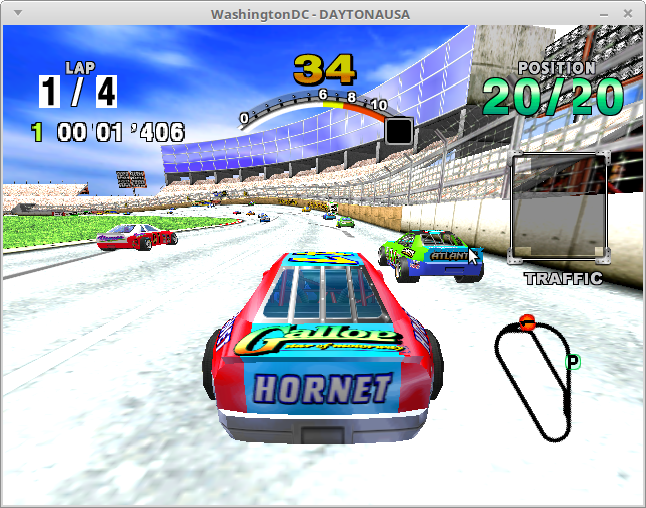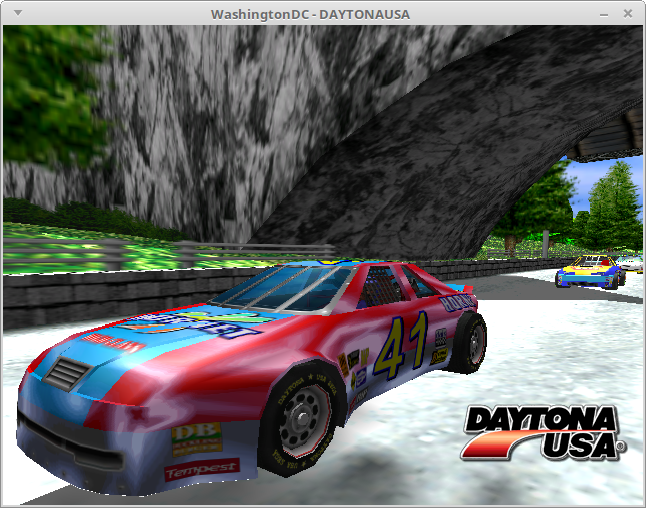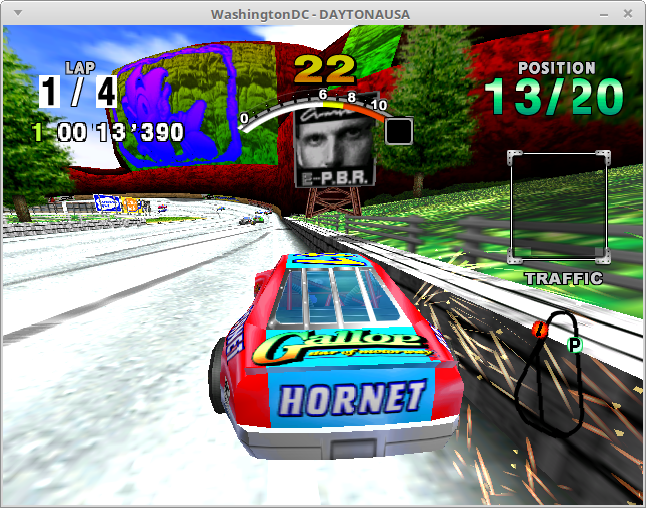T-minus six months to liftoff!
Wow, it's already been five months since I wrote the post about regression testing! This site might not have changed much, but there's been a lot going on with WashingtonDC in that time. When I wrote that last update, WashingtonDC was barely rendering the Dreamcast's spiral-swirl bootup at a mere 8% speed (on my PC). Back then WashingtonDC only had a simple interpreter. Now it has a dynamic recompiler (sometimes called a dynarec) which crushes the spiral-swirl at an average speed of 140%. That's faster than a real Dreamcast!
In-game performance isn't quite as perfect as bootup performance; you can generally expect that to swing between 30% and 60%. I think the main bottleneck there is the FPU; all of its opcodes are implemented by calling into the interpreter's FPU opcode handlers. This brings in all the overhead of a function call, plus the overhead of not being able to hold stuff in registers for long periods of time, plus the overhead of having to branch based on whether the FPU is configured for single or double precision on every instruction. I imagine that can add up and turn into a bottleneck even though it's just one subset of the SH4's instruction-set.
Most importantly, I just got Daytona USA booting a couple nights ago! A lot of the textures are being rendered with the wrong colors, but Three-Seven Speedway still has its classic charm. I haven't gotten any new games working since Crazy Taxi started working way back in September (or was it October?), so I'm excited to finally have a third game in my testing set alongside Crazy Taxi and Power Stone.



Beyond that, there are a bunch of games which are booting, but can't make it ingame. Puyo Puyo~n shows a message in Japanese (which I think is it complaining about the VMU not being plugged in) before failing due to unimplemented functionality. Evolution: The World of Sacred Device bitches about the VMU not being plugged in and then flashes the logos of its developers before ultimately failing due to unipmlemented functionality. Shenmue and Jet Set Radio both display "Now Loading" screens before failing (due to unimplemented functionality, of course). Twinkle Star Sprites technically gets in-game, but the graphics are heavily corrupted.
I didn't quite get around to finishing the regression tests I was talking about in my last post; I don't think I've touched them since January. I need to keep my time balanced between auxiliary stuff like that and exciting stuff like making progress. Naturally, the boring auxiliary stuff gets way less attention compared to exciting things like a faster recompiler and booting new games. I'll get back around to it some day.
The primary thing that keeps WashingtonDC from booting most games is the ARM7 CPU. This is a relatively unadvanced 45MHz RISC machine which is wired into the Dreamcast's audio system (AICA). Games can load whatever code they want onto the ARM7 to control AICA. Most games will end up hanging indefinitely without this because the SH4 spins forever waiting for the program it just loaded onto ARM7 to respond. I get around this by manually hacking the AICA memory to show games what they want to see (so they think the ARM7 program is responding) but this is only feasible for a very small set of games, and if you actually want the audio to work then it's not feasible for any games at all.
I don't anticipate that it will be difficult to implement ARM7 emulation, but I do expect it will be difficult to keep this and the SH4 in sync with each other. I've been making a lot of infrastructure changes to support this and I still have more work to do before I can begin implementing the ARM7 in earnest.
After that the obvious next steps are to get the audio working, and to get WashingtonDC running at a smooth 60FPS on typical games. I want to have WashingtonDC ready for a release (insomuch as you can "release" something that's been sitting in a publicliy-accessible github repo since 2016) on 11/27/2018. That's the twentieth anniversary of Dreamcast's Japanese launch, so it's the perfect date to launch a Dreamcast emulator. That gives me 202 days, which is a tight schedule but I ought to be able to get WashingtonDC to a level of basic functionality by then.
I also intend to overhaul this site and have a real regularly-updated development blog going like other emulator projects. I might end up moving to a dedicated blogging platform or I might overhaul this webpage into something less spartan. Whatever I do, I probably won't get around to it until after I have the ARM7 working at the earliest. Ever since I got started way back in October 2016 I've been treating WashingtonDC like my hobby project, but going forward I'm going to have to start treating it as a product (albeit an open-source product that doesn't make any money).
To that end, I think I need a new name. "WashingtonDC" has always been a placeholder name which I chose because it has DC in it, and also because I was watching the 2016 Presidential Debates when I got started. I don't actually live in Washington DC or even Washington state so it feels a bit dishonest to keep calling it that. In my head, I tend to abbreviate it to "wash", so I'm thinking of rebranding WashingtonDC as washDC, with the logo being a wave (of water) curled over to vaguely resemble a Dreamcast logo. The other benefit of this is that I'll get better search-engine results if my emulator doesn't share a name with the capital of the United States (as somebody on /r/emulation astutely pointed out back in February).